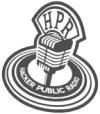HPR1427: Decoding HPR1216 the easy way and a bit more
Hosted by mirwi on 2014-01-21 00:00:00 Download or Listen
HPR Comments
Mastodon Comments
More Information...
Copyright Information
Unless otherwise stated, our shows are released under a Creative Commons Attribution-ShareAlike 3.0 Unported (CC BY-SA 3.0) license.
The HPR Website Design is released to the Public Domain.
